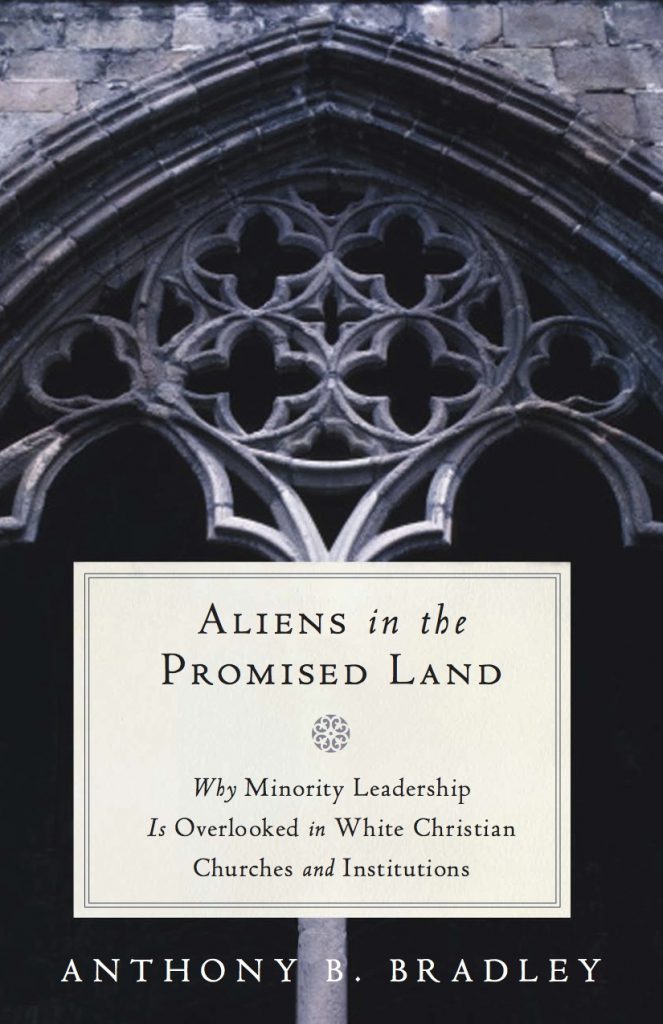Edited by the prolific theologian Anthony Bradley, Aliens in the Promised Land: Why Minority Leadership Is Overlooked in White Christian Churches and Institutions is a timely collection of essays challenging the evangelical powers-that-be about the inclusion of ethnic minorities within leadership structures of both churches and higher education. By implication, the volume opposes systemic and institutional racism within evangelical churches and other institutions. This work offers a wide array of insight from minority leaders within evangelicalism on the issues of race and inclusion—from the rather startling argument by Lance Lewis (“Black Pastoral Leadership in Church Planting”) that white evangelical churches should put a moratorium on planting churches in African American communities to Ralph Watkins’s lament (“A Black Church Perspective on Minorities in Evangelicalism”) about the exclusion of an African perspective in a Fuller Seminary church history course. Though the volume’s arrangement lacks thorough cohesion, it’s a welcome addition to other recent publications on the issue of race in evangelical churches and institutions like Edward Gilbreath’s Reconciliation Blues and George Yancey’s sociological study Neither Jew Nor Gentile.
The major strength of Aliens in the Promised Land is the collection of self-narratives offered by the majority of the contributors. Written by African Americans, Latinos, and one Asian American, these stories allow readers to sympathize and, for some, empathize with the struggles they’ve endured as evangelicals of color. In Bradley’s introduction, he shares the tension and anguish of being a Reformed evangelical amid a never-subsiding tide of racism. He recalls “John Calvin-loving racists” posting overtly racist things about him on the Internet in 2004. In a poignant statement, the professor of theology King’s College in New York City remarks, “Some of those for whom the Puritans are precious did not welcome my presence among them” (13). Another powerful story emerges from Harold Dean Trulear’s chapter, “Blacks and Latinos in Theological Education as Professors and Administrators.” Trulear, associate professor of applied theology at Howard University’s Divinity School, relates a conversation with an evangelical African American pastor who told him that while attending a theologically conservative seminary, members of the majority culture treated him “like a dog.” But when he matriculated at the religion department of a liberal school, professors and colleagues treated him “like a man” (96).
Others such as Orlando Rivera (“Blacks and Latinos in Theological Education as Students”) and Vincent Bacote (“Ethnic Scarcity in Evangelical Theology: Where Are the Authors?”) share autobiographical nuggets that situate them within both post-civil rights U.S. history and evangelicalism. As scholars at Nyack College and Wheaton College, respectively, they pinpoint those extra layers of difficulty at evangelical institutions for scholars and students alike. They cite difficulties such as the need to recruit and maintain more minority students and faculty, as well as the necessity of creating networks for minority graduate students in the field of theology. These stories and observations highlight the grave disconnect between the evangelical commitment to preserving sound doctrine and its commitment to alleviating racism both in America and within its own domain.
Aliens in the Promised Land: Why Minority Leadership Is Overlooked in White Christian Churches and Institutions
Anthony Bradley
Aliens in the Promised Land: Why Minority Leadership Is Overlooked in White Christian Churches and Institutions
Anthony Bradley
Many Challenges
Another strength of Aliens in the Promised Land is the plethora of challenges offered by the contributors—in particular Amos Yong and Juan Martinez on transnationalism. Both argue white evangelicals have failed to understand transnationals within the ranks of evangelicalism. In his chapter “Race and Racialization in a Post-Racist Evangelicalism: A View from Asian America,” Yong, dean of the School of Divinity at Regent University, criticizes white evangelicals for neglecting “to understand the Christian faith in a global context.” According to Yong, Asian immigrants and Asian Americans possess a “global consciousness” that negates the need to assimilate into American evangelicalism (53). This issue is likewise important for Latinos, Martinez asserts. In his chapter titled “Serving Alongside Latinos in a Multiethnic, Transnational, Rapidly Changing World,” the professor and administrator at Fuller Seminary maintains Latino students in American seminaries offer a rich, global, and dynamic spiritual perspective that “may be better able to respond to postmodern reality” (67). As a result, seminaries should open ways for non-Latino students to learn from their Latino counterparts about ministry in “an increasingly diverse world” (67).
Though this volume offers a wide scope of the negative effect of race on evangelicalism, including the entire Lutheran Church-Missouri Synod’s study on race published in 1994 (found in the appendix), it suffers from a modest lack of cohesion in organization. For example, Rivera’s chapter on problems faced by African American and Latino students lacks coordination with others in that it fails to highlight minority leadership in the church or the academy specifically. Likewise, Carl Ellis’s chapter on discipling urban young men, though highly practical and informative, fails to connect solidly with other contributions. Both of these chapters upset the flow of the book.
Despite the forgivable problem of a lack of seamless cohesion, Bradley’s edited collection is critical for evangelicals during this period of heightened racial sensitivity in America. Its candor should be taken as truth-telling and redemptive, and it deserves careful reading by all with open ears and open hearts. Bradley concludes with a stinging yet important assertion regarding how to proceed in this work of racial reconciliation: there must be a discussion of white privilege in order for white evangelicals “to use their privilege redemptively in a broken world” (153). If such an inclusion is carried into the conversation of racial reconciliation, much fruit will be borne and needed healing will occur.
